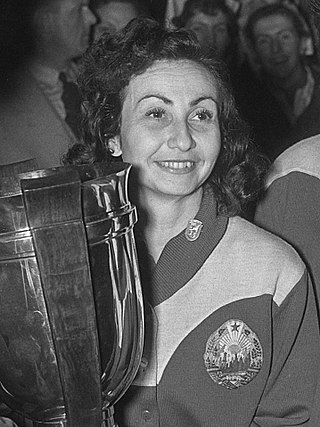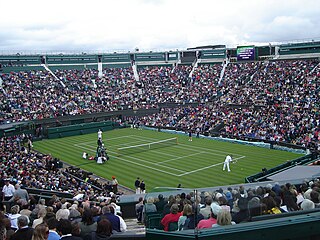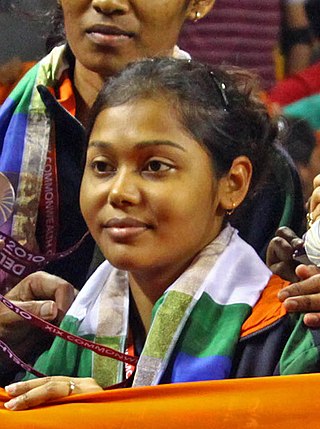Deng Yaping is a Chinese table tennis player, who won eighteen world championships including four Olympic championships between 1989 and 1997. She is regarded as one of the greatest players in the history of the sport.

Ann Shirley Jones, is a British former table tennis and lawn tennis champion. She won eight Grand Slam tennis championships in her career: three in singles, three in women's doubles, and two in mixed doubles. As of 2023, she serves as a vice president of the All England Lawn Tennis and Croquet Club.

Angelica Rozeanu was a Romanian table tennis player of Jewish origin, the most successful female table tennis player in the history of the sport, winning the women's world singles title 6 years in succession.

The racket sport traditionally named lawn tennis, invented in Edgbaston, Warwickshire, England, now commonly known simply as tennis, is the direct descendant of what is now denoted real tennis or royal tennis, which continues to be played today as a separate sport with more complex rules.

Mouma Das is an Indian table tennis player. Born and brought up in Kolkata, West Bengal, she has represented India in international events since the early 2000s. Das has won multiple medals at the Commonwealth Games including a gold in the Women's Team Competition in 2018. She was awarded the Arjuna Award, India's second highest sporting honour in 2013 for her contributions to the sport.

Feng Tianwei is a retired Singaporean table tennis player. Born in Harbin, China, she permanently moved to Singapore at the age of 20 under the Foreign Sports Talent Scheme in March 2007 and commenced her international career in competitive table tennis the following month.

Chunli Li is a Chinese-born New Zealand female professional table tennis player. She won a gold, silver and two bronze medals at the 2002 Commonwealth Games to cap off her long career.
Karen Li is a table tennis player for New Zealand. At the 2002 Commonwealth Games she won a silver medal partnering her sister Chunli Li in the women's doubles and a bronze medal in the team event.
Jenny Hung is a semi-professional table tennis player from Christchurch, New Zealand. She is currently ranked #3 in New Zealand, #19 in Oceania and #662 in the world for Open Women's table tennis. Hung has been the top ranked female junior in New Zealand for the past several years and is a representative player for both Canterbury region and New Zealand. Her most notable achievement came at the 2009 Australian Junior Open, where she became the first New Zealander and the first player from Oceania to win an ITTF Junior Circuit Singles title.

Ella Zeller is a retired Romanian table tennis player, coach and administrator. Between 1952 and 1964, she won several medals in singles, doubles, and team events in the Table Tennis European Championships and in the World Table Tennis Championships. In 1995, she was inducted to the ITTF Hall of Fame.

Diane Schöler was an English table tennis player. In 1966 she married German table tennis player Eberhard Schöler, and from that time on competed for West Germany. From 1951 to 1972 she won several medals in single, double, and team events in the Table Tennis European Championships, and in the World Table Tennis Championships.

Lisa Daniela "Danni" Di Toro is an Australian wheelchair tennis and para table tennis player. Di Toro was the 2010 French Open doubles champion and has also been the Masters double champion. In singles, Di Toro is the former world number one and two time masters finalist. In 2015, she moved to para-table tennis and represented Australia at the 2016 Rio Paralympics, where she was team captain with Kurt Fearnley. At the 2020 Tokyo Paralympics, her seventh Paralympics, she was the team captain and Opening Ceremony flag bearer with Ryley Batt. She has been selected to compete at her eight Paralympics in Paris.

Melissa Tapper is an Australian table tennis player. After competing at the 2012 Summer Paralympics, she represented Australia at the 2014 Commonwealth Games in elite non-Paralympic competition. In March 2016, she became the first Australian athlete to qualify for both the Summer Olympics and Summer Paralympics.

Thelma Thall "Tybie" Sommer is the only living American woman to have won two World Table Tennis Championships.
Heather Jean Robson was a New Zealand badminton and tennis player.

Erin Hope Routliffe is a New Zealand professional tennis player who previously represented Canada. She became world No. 1 in doubles on 15 July 2024. Routliffe won a major doubles title at the 2023 US Open partnering Gabriela Dabrowski. She became the second New Zealand woman to win a major in the Open Era, after Judy Connor won the women's doubles title at the 1979 Australian Open. Routliffe was a two-time NCAA doubles champion with Maya Jansen for the 2014 and 2015 seasons.
Julia Wu is a right-handed table tennis player from New Zealand who has represented New Zealand and Oceania in a number of international championships, including the 2010 Summer Youth Olympics held in Singapore and the 2015 Summer Universiade in Gwangju. She plays with a shakehand grip. In the 2009 ASB Young Sports Person of the Year Awards, Wu was a finalist in the Girls Table Tennis section.

Soo Yeon Lee is a South Korean former table tennis player, model, actress and coach. Lee started playing table tennis at a very early age and was also trained extensively in the sport by an Olympic gold medalist Jung Hwa Hyun in South Korea. Soon thereafter she went on to successively win the Korean National Junior Championship six times since the age of 12. She has been featured in advertisement campaigns for a number of prominent brands including Nike, Adidas, K-Swiss, Red Bull, and Target. She is the brand ambassador for SPiN, a chain of table tennis restaurants and bars.

Dame Ruia Mereana Morrison is a retired New Zealand tennis player. Morrison was the first New Zealand woman and the first Māori person to play at Wimbledon and reached the fourth round in both 1957 and 1959. She also won 13 national New Zealand tennis titles.
Barry Graham Wynks was a New Zealand lawn bowler.













